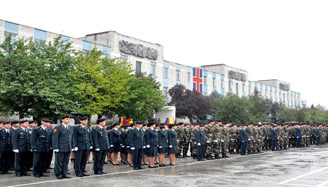Milestones in NATO’s deepening cooperation with Moldova
On Wednesday 24 June, NATO defence ministers endorsed a defence capacity building package to help Moldova to enhance its defence and security institutions. Other milestones were reached last week in the area of defence education, which will be an important element of cooperation with the country under the Defence and Related Security Capacity Building (DCB) Initiative.

Allied leaders invited the Republic of Moldova to participate in the new DCB Initiative when it was launched at the NATO Summit in Wales in September 2014. The Initiative aims to reinforce support for partners in the current security environment. It is a way for the Alliance to project stability without deploying large combat forces, as part of NATO’s overall contribution to international security and stability, and conflict prevention.
Through expert advice and assistance, training and education, Moldova’s DCB package will assist the country in strengthening and modernising their armed forces and reforming the Moldovan national security structures.
Education is a key agent for transformational change, which supports institutional reform in partner countries. Since 2008, NATO has been advising Moldova on how to build, develop and reform educational institutions in the defence and military domain through a tailored Defence Education Enhancement Programme (DEEP).
Enhancing defence education
With the assistance of expertise offered through DEEP, the “Alexandru Cel Bun” Military Academy of the Armed Forces has made exceptional progress over the past few years in implementing the full range of modern professional military education. It has successfully created and executed new curricula across all programmes and continues to refine as well as create new courses, incorporating modern subject matter. It has adopted new academic structures and modern teaching methods with an emphasis on critical thinking. The NATO team declared capacity for the Moldovan programme at a ceremony at the Ministry of the Defence on 26 June.

Last week also marked the graduation of the first class of officers from the Moldovan Military Academy’s new four-year degree course developed under the DEEP. A number of Allied defence education institutions have worked together with their Moldovan partners to fully transform and modernise this commissioning course for new officers – a genuine demonstration of cooperative security in building capacity through defence education.
NATO Deputy Secretary General Alexander Vershbow congratulated the graduates by video message on 27 June. “You represent a serious and very important investment by your national and senior defence leaders to build a foundation of military officers that will advance the notions of Euro-Atlantic professionalism and service to the nation. […] The security environment has changed rather dramatically since the day you first entered the academy and began your studies. Some may argue that these are perilous times for your nation, but you represent the hope and promise for a strong and secure future for the Republic of Moldova.”
NATO and the Moldovan Military Academy have already agreed to continue the fruitful cooperation to sustain achieved results as well as ensure that Moldova’s experience benefits other DEEP partners in improving their national defence education institutions.
There are currently 11 individual country DEEP programmes for partners being managed by NATO with Afghanistan, Armenia, Azerbaijan, Georgia, Iraq, Kazakhstan, Mauritania, Moldova, Mongolia, Serbia, and Ukraine.
